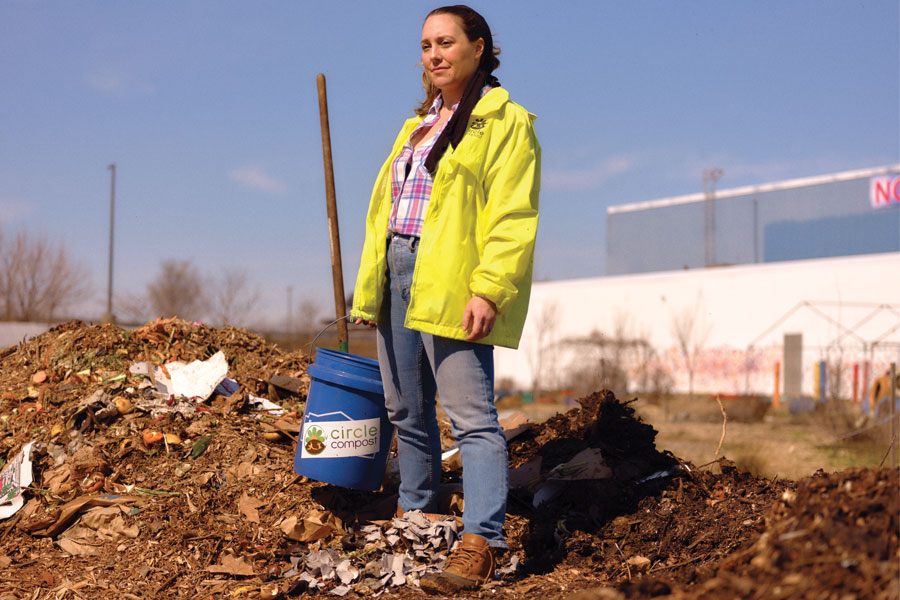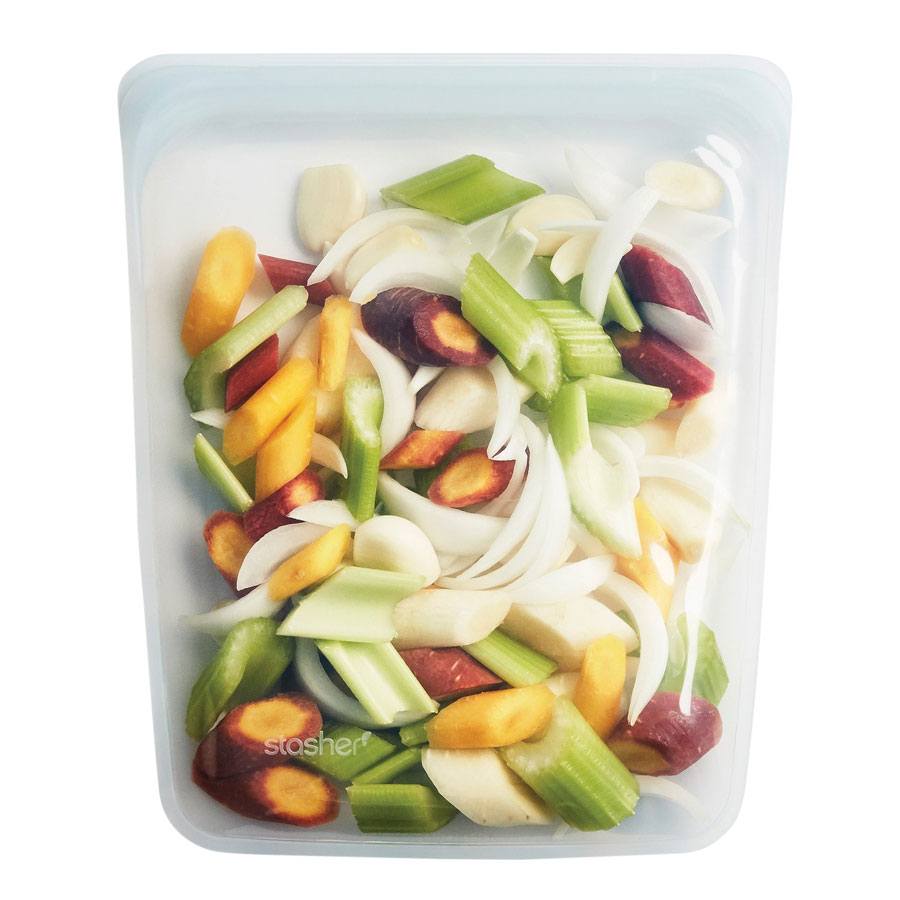10 Ways to Create Less Waste at Home

Michele Bloovman, owner of Circle Compost, which offers one service you can turn to when looking to create less trash each week. Photograph by Christopher Leaman
This article was originally published in our April 2020 print issue as a part of a guide to living a zero waste lifestyle. Given the current trash crisis in Philadelphia, we are publishing this guide online to share ways to make less waste.
We’ve got a reputation here in Philly when it comes to garbage: We make a lot of it, and we dispose of it pretty much everywhere. It’s about time we stop throwing it all away. Here, 10 tips for living a happier, healthier, less wasteful life.
1. Embrace composting.
Food waste is the single biggest category in municipal landfills, which is problematic because food waste creates a lot of greenhouse gas. Luckily, composting said food waste is “easier than you can even imagine,” says Michele Bloovman, owner of Philly’s Circle Compost. Sign up for a service — there are several in the city, starting at around $12 a month — and get a five-gallon bucket to fill with food scraps, including fruits, vegetables, coffee grounds, rice, flour and more. Meat, dairy and high-fat items are verboten, but surprising items that can be composted include bamboo toothbrushes, chopsticks, and pizza boxes (which the city won’t recycle because of the grease). The bucket gets picked up weekly or bi-weekly, and you can even get back finished compost to keep your window boxes happy.
2. Ditch sandwich bags.
According to the Environmental Protection Agency, Americans use 380 billion plastic bags and wraps each year. Reduce your use by avoiding such bags for food storage. Beeswax wrap (reusable and compostable cotton cloth infused with wax and resin) works well for covering bowls and swaddling lunch-box sandwiches; reusable dishwasher-safe bags like Stashers, made from food-grade silicone, are another versatile alternative. Conshohocken-based newlywed Ellen Gilroy and her husband added a set to their wedding registry: “We got a bunch of different sizes, so we can use them for pretty much everything.”

Trade your single-use plastic bags for reusable silicone versions, like this one from Stasher.
3. Maximize ingredients.
According to Philabundance, 40 percent of food in the U.S. is wasted. Shift your mind-set in the kitchen to reduce waste. Kiki Aranita, owner Poi Dog in Rittenhouse Square (which recently closed), is a zero-waste-kitchen master. At home, she saves every vegetable scrap and chicken bone for stock: “I just throw it all in the Crock-Pot so I don’t have to watch the stove.” She freezes anything she can’t transform into stock right away and also saves parmesan rinds to flavor her tomato sauce and ginger skins to brew into tea.
4. Use your garbage disposal.
After composting, the next-best way to get rid of food scraps is to throw them down the garbage disposal. In 2013, the city opened a biogas co-generation facility that transforms organic matter (e.g., your apple peels and moldy bread) into natural gas via a cool chemical process. Just don’t add your coffee grinds, says Nic Esposito, Philadelphia’s zero-waste and litter director. They’re considered “FOG” — fats, oils, grease — and can clog up the water system, causing an expensive headache for the city.
5. Break the paper-towel addiction.
It’s easy to go through a roll of paper towels each week. Philly Mag editor and mother of two Christine Speer Lejeune broke her habit with a few simple steps. First, she buys cloth napkins in pretty colors and keeps a “huge pile” in an accessible basket. “Having them on display makes using them much more convenient,” she says. Napkins get used with meals for at least one day, if possible, and a ceramic pot in the kitchen holds the used ones before they head to the laundry room. When they get too worn, napkins become … cleaning rags. Lejeune still uses paper towels — about two rolls a year — which she keeps under the sink, behind a baby lock, so they’re a little more work to access.
6. Rethink detergent.
Most laundry detergent — even the eco-friendly options — comes in single-use plastic jugs. Julie Hancher, co-founder and editor of sustainability blog Green Philly, suggests bringing your own container to a bulk bin shop like Mom’s Organic Market in Center City. “You’re not getting charged for the extra weight because they tare the bottle first,” she says, adding that the store typically uses eco-friendly brand Sun & Earth, headquartered in King of Prussia. (Mom’s also sells liquid hand soap and dish soap this way.) If BYO-jug sounds inconvenient, Hancher suggests a service like Philly-based Dropps, which ships (via carbon-neutral means) plastic-free, dye-free laundry pods in compostable boxes.
View this post on Instagram
7. Rethink drying.
“If you have the space, hang your clothes out to dry,” Hancher says. When you do fire up the dryer, forgo dryer sheets. Philly-based Bog Berry Handicraft makes vibrantly colored wool dryer balls — an eco-friendly alternative that keeps the sheets out of the landfill and reduces drying time (a money-saving bonus!). They run $38 for a set of six, and Hancher says hers are in great shape after nearly a decade of use.
View this post on Instagram
8. Don’t trash fabric.
Clothing in the landfill is another greenhouse-gas disaster. Whether you shop at H&M or not, says Dominic McGraw, the efficiency and projects manager in Philly’s Office of Sustainability, the retail giant has a drop-off that accepts old clothes, sheets, towels, and other textiles, like socks and underwear, that may be too ratty for donation (note: the program is currently on hold due to COVID). The company turns the used items into products like cleaning cloths. Madewell, the clothing brand owned by J.Crew, also has a cool program that takes your old jeans: You get $20 toward a new pair, and they turn the old ones into insulation.
9. Try a buy-nothing group.
The Buy Nothing gift-economy organization that started in 2013 has hyper-local groups in countries around the world, including 63 in the Philadelphia area. Tap into yours via Facebook, and use it to give your old stuff a good home with people who are thrilled to take your decade-old coffeemaker or maternity sweaters. Also, be surprised by what your neighbors are giving away, from baby strollers to leftover takeout. When Green Philly moved offices recently, Hancher tapped into her local group to furnish the new space, scoring a bookshelf, an espresso machine and even artwork.
10. Parents: Do the best you can.
Nic Esposito calls parenting the “final frontier” of zero waste. It’s hard to live that sustainable life when kids are so … messy. Babies can use up to 3,000 diapers in the first year alone. But while cloth diapers have come a long way, they’re not for everyone. Esposito suggests trying cloth for the first few months of your baby’s life, when she’s going through up to 12 diapers daily. (The Nesting House can guide you through the process.) And while he admits that baby-food pouches are easy to use, they aren’t easily recycled. Instead, puree your own produce — it’s healthier and saves money, too. “Just do the best you can,” he says.
Published as “Waste Not” in the April 2020 issue of Philadelphia magazine.


